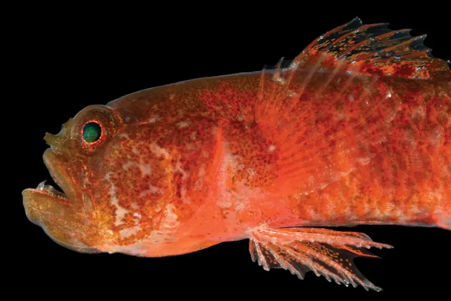Credit: CC BY-SA 4.0
In the depths of the Red Sea, a remarkable new fish species with a uniquely grumpy appearance has been uncovered by researchers. Dubbed the “grumpy dwarfgoby,” this tiny predator measures less than two centimeters and is characterized by its menacing expression and pronounced canines. The discovery adds another fascinating entry to the Red Sea’s already rich marine biodiversity.
Lucía Pombo-Ayora, a researcher involved in the study, highlighted the fish’s striking features. “In its tiny world, it’s likely a fearsome predator. Its grumpy expression and large canines are endearing yet intimidating,” she commented. The fish’s vibrant red color serves as camouflage against the coralline algae dominating its reef habitat. Preferring the safety of small crevices, the grumpy dwarfgoby uses its sharp teeth to prey on invertebrates.
Published in ZooKeys, the study reveals that the species was first identified in the Farasan Banks off Saudi Arabia’s coast, with subsequent observations near Thuwal in the central Red Sea. Initially mistaken for the fiery dwarfgoby (a species identified in 1972), the grumpy dwarfgoby was confirmed as a distinct addition to the Sueviota genus after detailed analysis.
“The discovery of unique species like this highlights the untapped biodiversity of the Red Sea,” said Viktor Nunes Peinemann, one of the study’s authors. “However, it also underscores a troubling reality—environmental changes could lead to extinctions before some species are even documented.”
The Sueviota genus, established in 1988, now includes eight valid species found across the Indo-Pacific. Known for features like elongated pelvic rays and basal pelvic membranes, the genus continues to surprise researchers with its evolutionary diversity.
This discovery not only enhances our understanding of marine ecosystems but also emphasizes the urgency of conservation efforts in the face of environmental challenges. The grumpy dwarfgoby serves as a vivid reminder of the hidden marvels within Earth’s oceans and the need to protect them.

